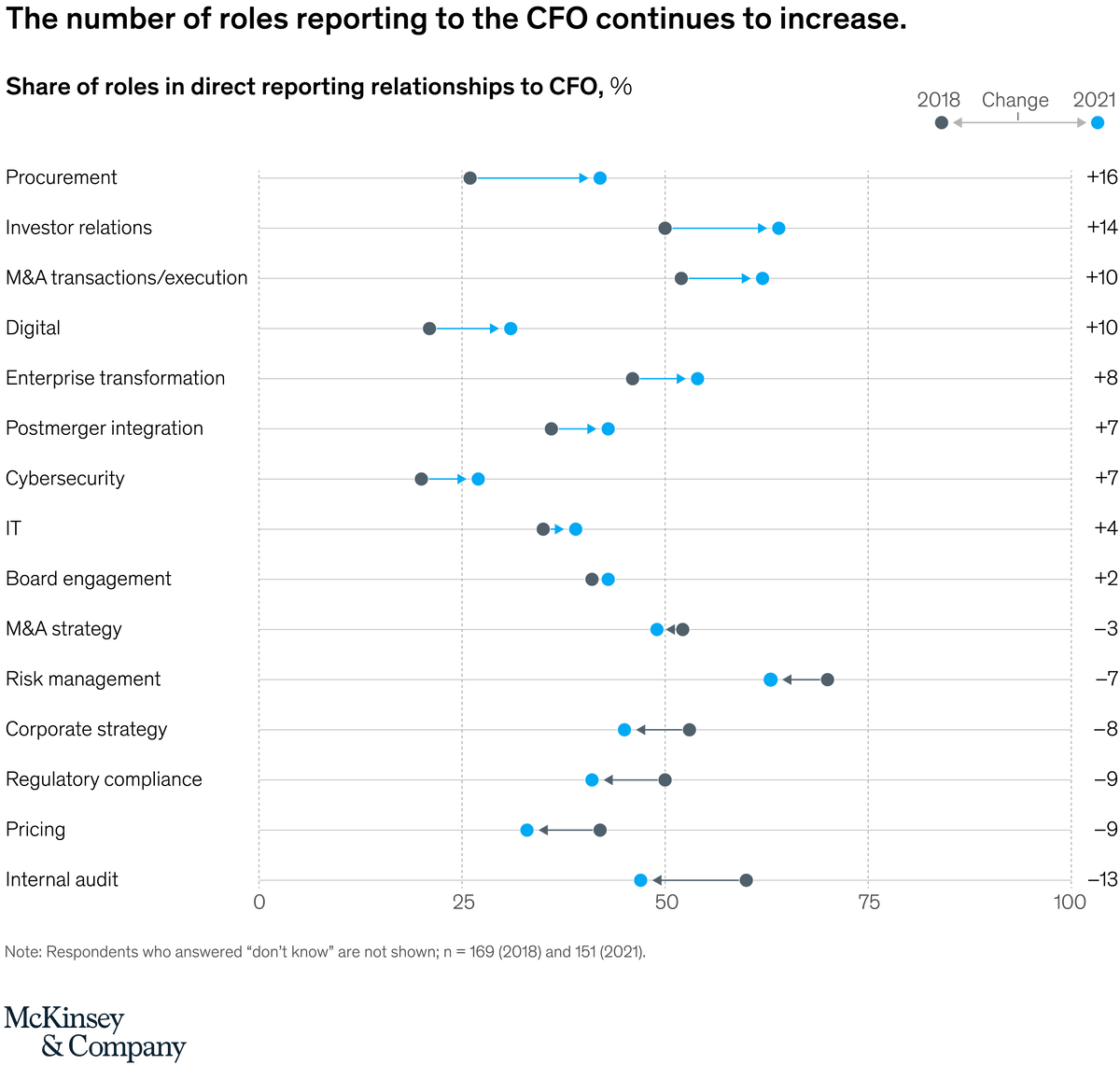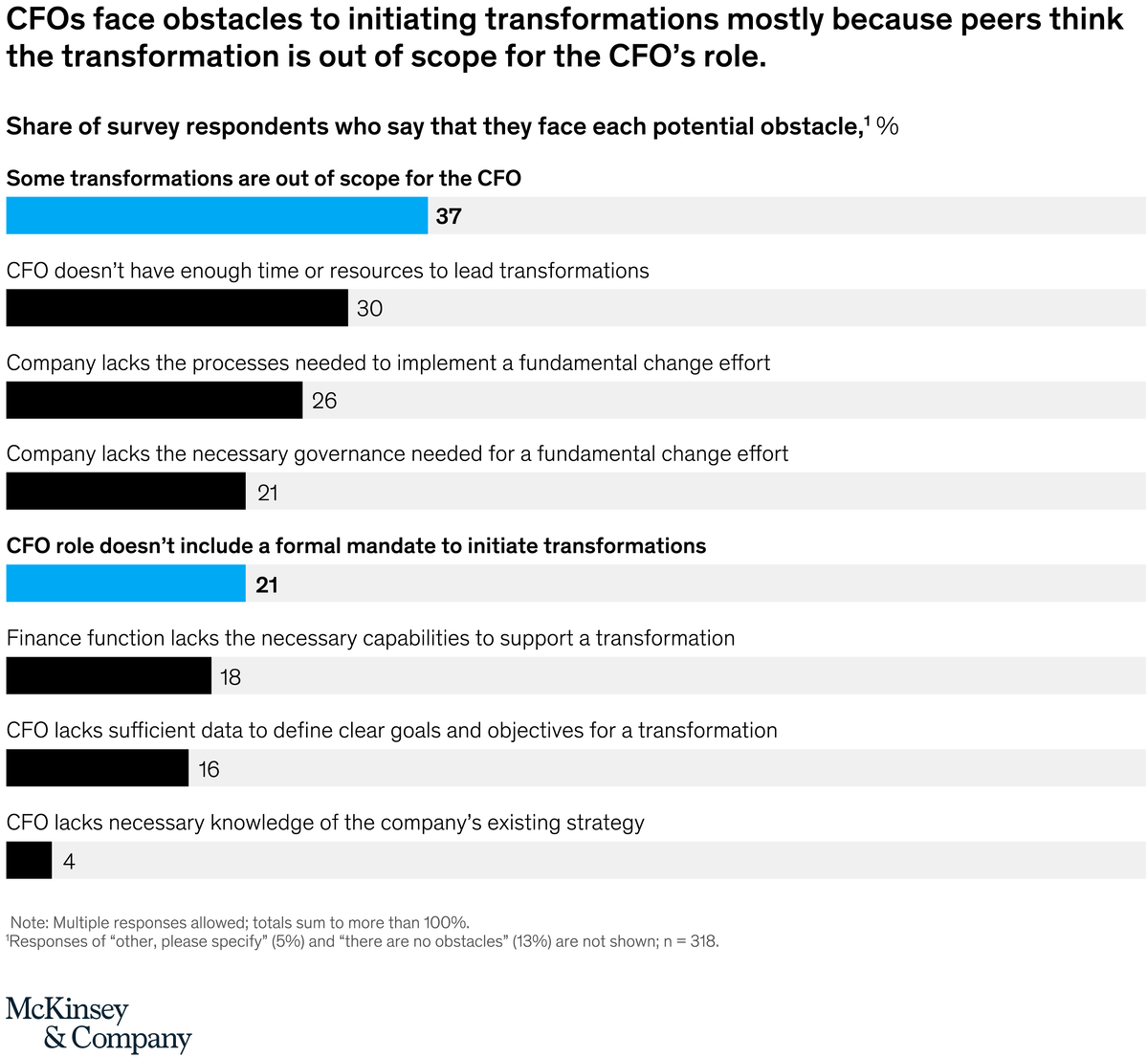
How finance leaders can reconcile and fulfill their growing portfolios of responsibilities.
This article was originally published by McKinsey & Company, please click here to view the article on their site
A recent McKinsey survey shows that the CFO’s role is rapidly evolving—expanding in scope, requiring new capabilities, and demanding greater collaboration with C-suite peers. In the first of three conversations on the changes that finance leaders face, two McKinsey experts along with Jørn Jensen, an experienced finance leader, discuss the CFO’s new mandate with communications director Sean Brown.
Sean Brown: Can you tell us about the CFO survey and what insights it yielded?
Ankur Agrawal: We have been conducting this survey every two years for more than a decade to learn what is on CFOs’ minds. We are living in a very uncertain, volatile time, and some of the findings reflect both the opportunity and the challenge of the role today. CFOs have influence on more and more functions (Exhibit 1). The magnitude of the change
is both impressive and broad. Secondly, the time for digitisation in finance is now. Many enterprises are doing fundamental reviews of their business models, and finance leaders are exploring how to accelerate the pace of change.
A couple of areas in particular are on the next S curve of CFO leadership. Historically, organisational transformations were often about cost and so naturally they fit in the CFO domain. This survey suggests there are more digital transformations on the horizon where CFOs can play a radically different role. Additionally, ESG (environmental, social, and corporate governance) has become an important topic for investors, and CFOs are excited about what this could mean for their role beyond reporting.
Sean Brown: So the workload has increased and the focus is changing. What implications do these shifts have for the resources and talent CFOs need?
Ankur Agrawal: The first is the need for broad- based talent within finance teams. The scope of the function has expanded, so are you building the right bench, including folks with data science and engineering capabilities? Second, the intersection between finance and strategy—this push and pull of short term and long term—is more acute than ever, and many CFOs are placing more emphasis on linking finance and strategy in the budgeting cycle. We expect resource and capital allocation will become important topics on CFOs’ agendas in the next 12 to 24 months.
Important changes are also happening in the role of financial planning and analysis (FP&A), which is core to decision enablement. Finance teams need to use the right tools and capabilities for measurement and tracking of early warning signals to navigate the business. How CFOs serve as partners to their business leaders is another capability set that needs to fundamentally change. The message to finance professionals is that the breadth of skills required, the knowledge base you can gain, the types of roles you should aspire to play—that canvas is broader today than it ever was.
Sean Brown: Has the CFO role become too big? Does it need to be split up the way some organisations divide the chief marketing officer role?
Ankur Agrawal: Yes. We increasingly see bifurcation of the finance function at two bookends. One is extreme specialisation, where the accounting-heavy role has a number two or a number three who focuses exclusively on that part of the agenda. At the other end of the spectrum are decision-enablement roles. The head of FP&A, for example, acts as a counselor to business units. Other functions such as procurement, IT, and real estate sometimes have their own leaders who report to the CFO.
Sean Brown: Digitisation is one area where the CFO role has expanded. What aspects of finance have been most changed by new technologies?
Christian Grube: Adoption rates across all the financial use cases for technology have increased since 2018, especially in robotic process automation and advanced finance analytics. Both were certainly accelerated by the COVID-19 pandemic when many finance teams had to provide much more frequent updates on cash and business outlook. CFOs see the biggest value in applying digital analytics, not only for the finance function but in broader business operations. Jørn, does that need to not restrict yourself to driving digitisation in the finance function but take a broader view reflect your experience as a CFO?

Jørn Jensen: To me, the impact of digitisation in just finance is relatively limited. Old processes, wherever they might start in the organisation, always end up with finance so the CFO has to take a much broader perspective.
Sean Brown: To what extent have core finance tasks been affected by digitisation?
Christian Grube: Some of the core processes, such as payables and receivables management, have already largely adopted digital. The processes for which technology is growing more relevant are the forward-looking ones such as demand forecasting or cash-flow planning. Scenario management as well was one of the burning platforms during the pandemic.
Jørn Jensen: I imagine that inventory management will be critically important in the next eight to 12 months given all the supply chain disruptions we see globally. Volume and demand forecasting, scenario management, inventory management, and risk management are all very important in the shorter term.
<strong>Ankur Agrawal</strong>
Sean Brown: Does this mean CFOs need to prioritise certain aspects of digitisation?
Christian Grube: First of all, CFOs have a choice. They can decide whether they want to focus on driving digitisation in their own function, whether they want to become digital champions for the entire organisation, or they want to do both. CFOs also need to take a sharp look at the costs and benefits of digital use cases. Rather than make decisions based on the available tools or systems, they should define the road map for the function or the organisation and apply a cost-benefit analysis to prioritising the different digital investments. Also, a digital finance function requires new skills and talent, so one of the most important activities for CFOs now is proper talent management. How do you recruit, train, and retain digital talent that can help you drive the digitisation journey?
Additionally, for digitisation to work, two key prerequisites need to be in place: process standardisation for automation and a clear view on how automation benefits will be captured. In many cases, automation also requires putting the proper data architecture in place, so you have consistency across all the key performance indicators (KPIs), regions, and functions.
Jørn Jensen: Those basics have to be right not just in finance but the entire business, but fixing them is of less interest to most people outside finance. That means finance leaders need to become heavily involved at the beginning to set the architecture in place throughout the business.
Sean Brown: Many companies are undertaking broad organisational transformations these days. How has the CFO’s involvement changed?
Meagan Hill: Since the last time we ran the survey, we saw the number of CFOs initiating transformations increase. However, when we asked respondents, “What holds CFOs back from initiating transformations?” CFOs’ peers pointed to a lack of scope or formal mandate as primary factors (Exhibit 2). Once transformations are underway, peers say CFOs are most valuable when they focus on core finance activities essential to tracking and managing transformation performance, but CFOs say they should spend more time leading non-core finance activities such as developing employee capabilities and role- modeling new mindsets and behaviors.

Sean Brown: It sounds like there is a disconnect between the CFOs and their C-suite colleagues around the role that finance leaders should play. Jørn, how can CFOs overcome this perception gap?
Jørn Jensen: I’m not surprised about the perception difference. The mindset seems to be “I manage my part, you manage your part.” But it’s clear from the survey that CEOs want CFOs to lead more transformations, so I would not worry too much about this perception difference. My experience is that these differences reduce over time, even to the extent that other executives want more of the CFO’s help in other areas.
Sean Brown: What part of the organisation should manage analytics and dashboards, in your view— finance or marketing?
Jørn Jensen: In my experience, dashboards and data analytics were owned by the commercial area until we all understood that this was not ideal and then they became the responsibility of the CFO. I think that is where they belong.
Meagan Hill: I would support Jørn’s comment. A lot of the data you would mine through analytic activities need to be translated into insights, which the CFO, having an analytical mindset and a good understanding of the key value drivers of the business, is well positioned to do.
<strong>Christian Grube</strong>
Sean Brown: Ankur, you mentioned that ESG is becoming a big area of focus for CFOs. What role are they playing in that sphere?
Ankur Agrawal: ESG has been talked about as a reporting responsibility for CFOs and that is largely how investors and others perceive the CFO’s role in ESG today. But CFOs want to more actively shape ESG programs and better align them with strategy, finance, and how topics such as climate or social issues integrate with the company’s overall direction. The numbers speak for themselves: there is a 20- to 30-percentage-point higher alignment with strategic goals when CFOs are actively engaged in ESG topics.
Sean Brown: Do you find that finance leaders are as committed to the ESG agenda as their colleagues in other parts of the organisation?
Ankur Agrawal: CFOs tend to be a skeptical community, and some may wonder whether ESG programs are just the latest fad. We expected that skepticism to come through the data but, interestingly, they say that, if done right, ESG initiatives will contribute to topline growth and competitive differentiation in the long term. There are implications even in the short term, whether it is cost reduction or reduction of compliance and other risks to the business.
The key implication is that ESG is here to stay, and almost all respondents said that CFOs should be at the forefront of shaping the ESG debate. The second implication is integrating ESG in all kinds of processes, whether it is risk management or resource allocation. Thirdly, materiality matters— picking one or two areas where the organisation will have disproportionate impact. Finally, there is a need to upgrade processes to measure carbon footprint or societal impact of products and services, and rethink the performance management dashboard to integrate ESG.
Sean Brown: You’ve alluded to trade-offs between the long-term ESG goals and short-term impact. How should CFOs help the management team navigate those trade-offs?
Ankur Agrawal: The first responsibility of the CFO is to make those trade-offs transparent and provide the data and insights for the business leaders to make decisions free of biases. For example, I’m working with a company that is looking to change its approach to resource allocation for large capital investments. “Do you really need to build that factory? What remediation measures do you need to put in place?” Asking those questions is an important aspect of the CFO role. In some ways, the trade-off between short term and long term is a false trade-off. There are short-term actions you can take but capital markets can see through those short-term actions.
Sean Brown: As the CFO role expands, it starts to cross over into what the COO or the CIO does, for example. Do you have any advice on how to navigate those potential overlaps and avoid conflicts?
Christian Grube: Alignment between the different C-level functions requires being clear about the joint priorities, especially in the digital area, and often the CTO or the CIO and the CFO discuss who should be in the lead. CFOs should be explicit about the initiatives they will lead, and the more they drive the dialogue, the better they can manage what happens afterward.
Meagan Hill: No matter where the activity falls within C-level purview, there is a need to think meaningfully about resource allocation and prioritisation. That way of thinking lives within the office of the CFO, so while the lines may blur on who manages what, there is an opportunity for C-level peers to engage with each other to share perspectives.
Sean Brown: What overall message does the survey send to CFOs? Should they be excited about this expansion and evolution of the role, or worried?
Ankur Agrawal: This time of change represents an opportunity for the CFO to have disproportionate impact, becoming almost a copilot of the business with the CEO. Personally, I am excited about what is ahead in ESG. For the sake of my own kids and their kids, I think it’s important that CFOs play an important role in shaping their respective companies’ agendas on thorny topics like climate, societal inequities, and diversity.
Ankur Agrawal is a partner based in McKinsey’s New York office, Christian Grube is a partner in the Munich office, and Meagan Hill is an associate partner in Boston. Jørn Jensen, former group CFO of Dyson, is a senior adviser to McKinsey. Sean Brown, global director of communications for the Strategy & Corporate Finance Practice, is based in Boston.



